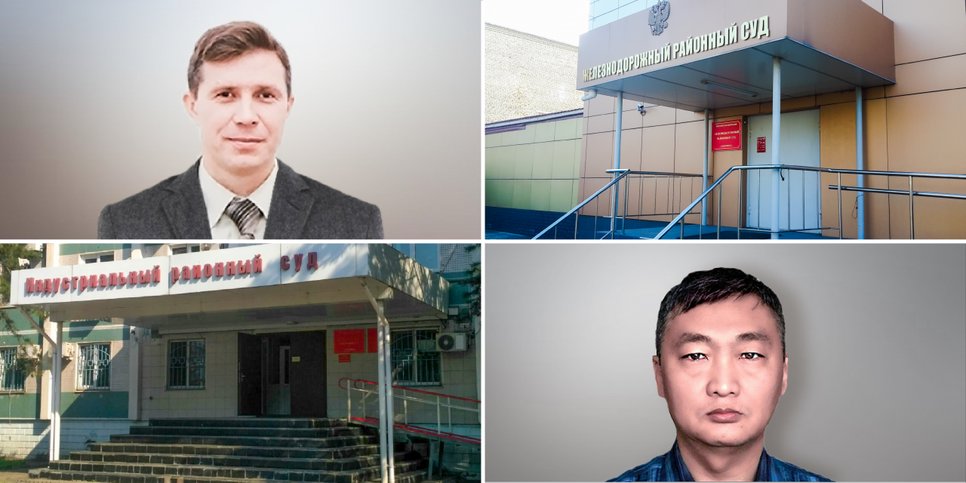Photo: Kim and Polevodov are on trial in two courts in Khabarovsk
Photo: Kim and Polevodov are on trial in two courts in Khabarovsk
Khabarovsk pliers: an electrician and a former criminologist are tried for faith in two courts at once
Khabarovsk TerritoryIn Khabarovsk, the Investigative Committee and the FSB did not share the dubious laurels of victory over believers. Now Stanislav Kim and Nikolay Polevodov are tried simultaneously for the same religious actions in the Industrial and Railway courts of the city - under Articles 282.2 (1) and 282.2 (2) of the Criminal Code of the Russian Federation.
November 10, 2019 marks exactly one year since more than 50 residents of Khabarovsk gathered in a rented café for a friendly party. This meeting was not a religious gathering: people planned to socialize together, enjoy treats and entertainment. Shortly after the start of the meeting, several dozen riot policemen burst into the café. Investigators of the Investigative Committee stood behind them.
These events marked the beginning of the criminal prosecution of six believers - Nikolai Polevodov, Stanislav Kim, spouses Vitaly and Tatyana Zhuk, Svetlana Sedova and 70-year-old Maya Karpushkina were under investigation. Three men were put in a pre-trial detention center, and later sent under house arrest, one is now under recognizance not to leave. The women were given a written undertaking not to leave the place. All six are charged with various parts of the "extremist" Article 282 of the Criminal Code of Russia. Investigators consider extremism not to be real criminal offenses, but faith in Jehovah God and meetings with fellow believers, including friendly parties.
Six months later, the Khabarovsk FSB, for its part, also opened a criminal case for faith - against 49-year-old Nikolai Polevodov and 51-year-old Stanislav Kim. Due to the callous attitude of the authorities, believers and their families are now forced to suffer doubly unjustly.
"Ends with ends." Stanislav Kim, 51, is a former forensic expert who worked for many years in the structure of the Ministry of Internal Affairs and drug control. During this time, he received awards and commendations. Previously, Stanislav watched from the inside how the law enforcement system works, but now he has become its victim.
Stanislav has two children, one of whom, a son, has been disabled since childhood. Now, because of the criminal prosecution, his health has deteriorated. "Chronic diseases have worsened. The chosen measure of restraint and prohibitions do not allow him to purchase basic necessities. Since his wife does not work, they have to make ends meet. All this has a very strong effect on Stanislav's psycho-emotional state," said lawyer Artur Ganin, who assists Stanislav Kim.
The life of 49-year-old electrician Nikolai Polevodov has also changed dramatically, although he is still free (he spent 66 days in pre-trial detention center No. 1 in the Khabarovsk Territory, 201 days under house arrest). "Nikolay is seriously worried about his little son, wife, because he does not know what the verdict will be. Will he be able to provide for his family, be a support and support for his wife, raise his son and participate in his life? At the moment, he is not able to fully work and earn a living, "said family friends.
"Formalism is higher than values." The uniqueness of the situation of Stanislav Kim and Nikolai Polevodov is that they are accused in two criminal cases at once. The first was initiated on the basis of a charge of organizing the activities of a banned extremist organization (part 1 of article 282.2 of the Criminal Code of the Russian Federation), the second on the basis of a charge of participation in it (part 2 of article 282.2 of the Criminal Code of the Russian Federation). Investigators do not merge cases into a single proceeding, as is usually the case. This means that law-abiding Russians face two criminal penalties, but now they are forced to go to two trials at once in different district courts of Khabarovsk - Industrial and Railway. Initially, the two criminal cases were investigated by different investigative bodies - the Investigative Committee and the FSB. The latter saw grounds for combining the criminal case and for this purpose handed over the documents to the prosecutor of Khabarovsk, but the prosecutor's office sent the case to the TFR "as is".
"The main reason for such decisions is the reluctance of the courts and the prosecutor's office to delve into the essence of the case. Unfortunately, for the judicial system, formalism is higher than the values and principles of the criminal procedure law," Artur Ganin believes.
According to Ganin, it is very difficult for believers to defend themselves, especially Polevodov, who does not have a law degree.
"This is a violation of the defendant's right to defense. Since he is not a lawyer, it is difficult for him to prepare for several trials at the same time. Of course, the situation itself is an element of pressure. First, the defendants see the formalism inherent in the judicial system. Secondly, if the court does not want to understand the obvious things and stand up for their rights, the big question arises as to how fair it will be at all," says Artur Ganin.
House arrest with "bugs". Stanislav Kim is currently under house arrest. This measure of restraint is considered to be mild, however, as explained by believers who have been or are under this judicial restriction, it causes a lot of inconvenience, mainly because of the atmosphere of fear created by the efforts of law enforcement agencies.
Many families fear that they have "wiretaps" at home - devices for hidden audio or video surveillance. Such fears are not unfounded. Surveillance and secret "wiretapping" of believers repeatedly preceded the arrests. There were cases when the tenants of the apartments themselves discovered listening devices.
"Sometimes the investigators themselves are intimidated by stories about wiretapping. In some cases, they demonstrate that they know everything about the family, sometimes they retell some phrases, reproduce dialogues. That is, it is clear that a camera and wiretapping were installed in the bedroom, "says Artur Ganin.
According to the lawyer, the hidden equipment is installed with the aim of "exposing" prayers and reading the Bible, which, according to law enforcement officers, is extremist activity, which means that the court may choose a stricter measure of restraint.
"People understand that the observance of the right to privacy, family secrets, inviolability of the home in relation to them has been erased," Ganin summed up.
The case of six Khabarovsk residents is another fact of the persecution of religious minorities in Russia. A variety of organizations have repeatedly expressed their concern about what is happening, and Russian President V. Putin called for "carefully understanding" what is happening. In September , the Committee of Ministers of the Council of Europe "urged the authorities to urgently take all necessary measures to ensure the right of Jehovah's Witnesses to practice their religion without hindrance."
Hearings in the Industrial District Court of Khabarovsk are scheduled for November 5 and 13, 2019, hearings in the Zheleznodorozhny District Court of Khabarovsk are scheduled for November 14, 18, 26 and December 5, 2019.
Update. The Industrial Court postponed the hearing from November 13 to December 5, 2019. As a result, on December 5, believers defend themselves at 9:30 a.m. in the Industrial Court, and at 2:00 p.m. in the Zheleznodorozhny Court of Khabarovsk.








